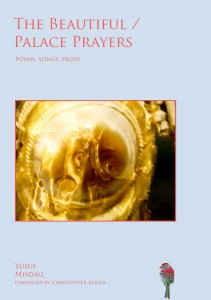The Beautiful / Palace Prayers
Ludwig Wittgenstein insisted that earnest philosophers should “descend into primeval chaos and feel at home there” if they expect to produce worthy work. I extend the same requisite to artists. Yusuf draws pictures, makes films, and writes poems, novels, and songs, but he is, above all, a mystic. And mysticism, in its quest to directly experience elemental truths, necessitates Wittgenstein’s appreciation of the primeval and the chaotic… In most cases, the mystical perspective is merely an uncommon one; mystics survey and respond to the same earthly, material realm that the rest of us do. But they disregard accepted classifications and train themselves to mindfully observe and reinterpret their surroundings, locating the extraordinary in the mundane. As Henry David Thoreau, a 19th century mystic, lamented, “All this [splendor] is perfectly distinct to an observant eye and yet could easily pass unnoticed by most.” Mystics reawaken their capacity for reflective wonder and, in doing so, experience a kind of rebirth into a vaster dimension of human experience.
So reborn into sublime beauty, mystics strive toward the transcendent. Both Wittgenstein and Thoreau can bedescribed as transcendentalists; Yusuf qualifies, too. Like the two philosophers, he finds in his observations of the world cause for a fundamental optimism. Unlike them, his writing is generally informal and devoid of pretension. His poems give readers the impression of a devout Sufi Muslim happy at play in our waking, sensual dream. In the collection’s title poem, Yusuf writes “Awake in this dream / Where abstract clouds calmly keep us. / Where birds secretly make love in public and / Give voice to the current of joy which / Slices through us in a day.” …

